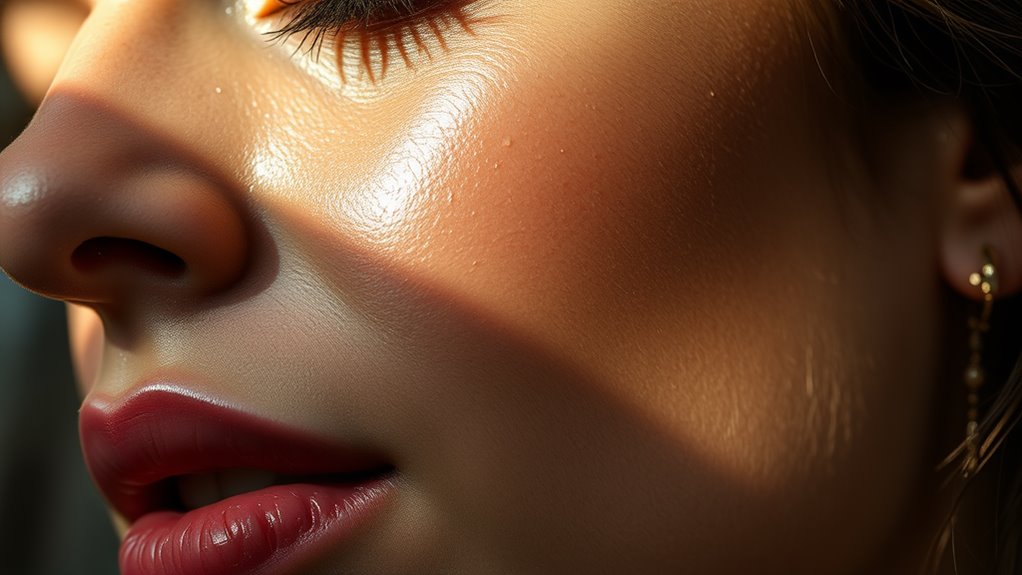Why Your Oily Skin Might Actually Be Dehydrated
Your oily skin might actually be dehydrated, which creates a frustrating cycle of excess oil and dryness. When your skin lacks water, it compensates by producing more oil, leading to a shiny appearance. You may notice tightness or dry patches despite the greasiness. The key is to properly hydrate your skin without clogging pores. Discovering effective hydration techniques can help you achieve that balance and keep your skin looking its best. There’s more to learn on this topic!
Understanding Oily vs. Dehydrated Skin
While it may seem that oily skin and dehydrated skin are similar, they actually have distinct characteristics and causes. Oily skin typically produces excess sebum, resulting in a shiny appearance and enlarged pores. You might find that your skin feels greasy, especially in your T-zone.
On the other hand, dehydrated skin lacks water content, leading to tightness, dullness, and even fine lines. It’s essential to understand this difference, as your approach to oily skin care should focus on balancing oil without stripping moisture. Dehydration can trigger excess oil production, making it crucial to address both issues for healthy skin.
To care for oily skin effectively, select lightweight, oil-free products that hydrate without clogging pores. Incorporate exfoliation into your routine to remove dead skin cells and prevent breakouts.
How Dehydration Triggers Excess Oil Production
When your skin becomes dehydrated, it can paradoxically trigger an increase in oil production. Your skin senses the lack of moisture and thinks it needs to compensate by producing more oil. This excess oil can leave you feeling frustrated, especially when you’re trying to achieve that balanced, healthy glow.
You’re not alone in this struggle; many face similar challenges. The cycle of dehydration and excess oil might make you feel disconnected from your skin goals.
When you nourish and hydrate your skin properly, you signal your body to stabilize oil production. Incorporating hydrating ingredients into your skincare routine can help break this cycle. Using lightweight moisturizers, drinking plenty of water, and avoiding harsh products are simple steps you can take. Additionally, hydration techniques such as using hyaluronic acid can significantly enhance your skin’s moisture levels.
Signs You May Have Dehydrated Oily Skin
Recognizing the signs of dehydrated oily skin can help you break the cycle of frustration.
You might feel like you’re in a constant battle with your skin, but identifying these key signs can bring clarity:
-
Tightness: If your skin feels tight or uncomfortable, it could be a sign of dehydration, even if it’s oily.
-
Flakiness: You may notice dry patches on your skin that seem at odds with your oily complexion.
-
Increased Oiliness: Oddly enough, if your skin’s producing more oil than usual, it may be crying out for hydration. This paradox can occur because the skin’s natural moisture levels are low, prompting it to overcompensate with excess oil production.
Effective Hydration Techniques for Oily Skin
Hydration is crucial for maintaining healthy, balanced skin, even if you have an oily complexion. To start, incorporate a lightweight, oil-free moisturizer into your routine. Look for gel-based formulations; they hydrate without adding heaviness.
Drink plenty of water throughout the day—hydrated skin starts from within!
Don’t skip exfoliation; it sloughs off dead skin cells, helping your skin absorb moisture better. Use a gentle exfoliant a couple of times a week to keep your skin fresh and minimize clogged pores.
Consider using a hydrating serum packed with hyaluronic acid. It attracts moisture, giving your skin a plump look without feeling greasy. This is because hyaluronic acid is known for its ability to hold up to 1,000 times its weight in water, making it an essential ingredient for hydration.
Lastly, try to avoid hot showers, as they can strip your skin of natural oils. Instead, opt for lukewarm water to maintain hydration levels.
Embracing these techniques can help your oily skin feel nourished and vibrant, allowing you to shine with confidence!
Choosing the Right Products for Balance
To achieve balance in your skincare routine, it’s essential to select the right products that cater to your oily skin without exacerbating dehydration.
You want to feel comfortable in your skin, and choosing the right items can make all the difference. Here’s what to look for:
-
Hydrating Serums: Opt for lightweight, water-based serums with ingredients like hyaluronic acid or glycerin. They hydrate without leaving a greasy residue.
-
Non-Comedogenic Moisturizers: A gel-based or oil-free moisturizer will help hydrate your skin while preventing clogging of pores. Look for labels that say “non-comedogenic.”
-
Gentle Exfoliants: Incorporate exfoliants with salicylic acid to help remove excess oil without stripping moisture. This keeps your skin clear and balanced.
Additionally, using products with hyaluronic acid can significantly enhance hydration levels, making it a key ingredient in your routine.

